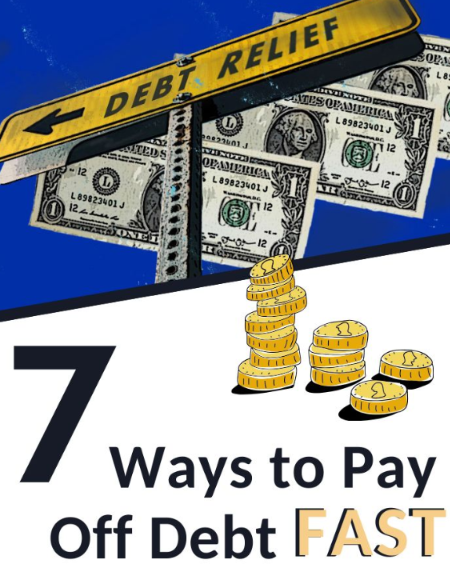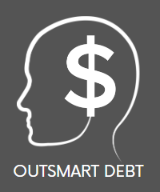Getting Out of Debt…. FAST
Debt can be a burden that weighs us down mentally, emotionally, and even physically. By following these steps and strategies, you can make significant progress in reducing your expenses and freeing up funds to pay off debt.
1. Check Your Budget:
Start by examining your income and expenses to create a realistic budget. Identify areas where you can reduce spending and allocate extra money towards debt repayment, especially credit card debt. Track your monthly expenses and eliminate unnecessary expenditures.
2. Bury Credit Cards:
While working towards reducing your debt, it is essential to avoid accumulating more credit card debt. Temporarily stop using credit cards and switch to using cash or a debit card for purchases. This will prevent the temptation to build up additional debt.
3. Shop with a List:
Create a shopping list before visiting a store and strictly stick to it. Impulse purchases often lead to unnecessary spending and hinder debt reduction progress. By planning your purchases in advance, you can avoid overspending and save money. Plan out your menu to allow for less-expensive bulk purchases that won’t go to waste. In other words, don’t buy a large package of chicken and end up having to throw part of it away because you decided to buy pizza. If you buy a bulk package, have a plan in place to use all of it, even if it means some needs to be frozen for another day.
4. Share Expenses:
Consider sharing expenses with family members or roommates. Splitting bills and other regular expenses can significantly reduce your financial burden and free up extra money to put towards paying off debts. Often, we’ll find that many items are packaged in a quantity that’s more than our family can consume. Instead of freezing the leftovers, we’ll share the meals with nearby family.
5. Evaluate Your Expenses:
Regularly review your expenses to identify areas where you can make cuts. Differentiate between essential and non-essential expenses. Cut back on non-essential expenses to accelerate your debt repayment journey. Look back 3 to 6 months of your bank and credit card statements. Separate the essential from non-essential expenditures. Notice any patterns that can be changed such as visiting Starbucks on your way to work every morning? Remember these expenses so you will know to avoid them until your debt is under control.
Getting out of debt requires discipline and commitment. By building a realistic budget, burying credit cards, shopping with a list, sharing expenses, and evaluating your expenditures, you can make significant strides in paying off your debts faster. Remember, every small step counts, and with perseverance, you can achieve financial freedom and break free from the burden of debt.
How to Pay Off Debt Faster
Paying off debt can seem overwhelming, but with the right strategies and techniques, you can accelerate your progress and achieve financial freedom sooner. Here are a few tips to help you pay off debt faster:
1. Generate More Income: Consider taking on a second job or finding ways to increase your income. The additional money can be used to make extra payments towards your debt, reducing the overall balance faster. A quick search on YouTube will yield an endless list of “side hustles” you may want to consider.
2. Pay Monthly Bills on Time: Late fees can add up and hinder your debt reduction progress. Make it a priority to pay your bills on time to avoid these additional charges and keep your debt repayment plan on track.
3. Declutter and Sell Unused Items: Take a look around your home and identify items that you no longer need or use. Sell these items through yard sales, online marketplaces, or consignment shops. The money you make from these sales can be put towards paying off your debt.
4. Utilize Unexpected Income: If you receive unexpected income such as a tax refund or a work bonus, resist the temptation to splurge. Instead, allocate that money towards your debt repayment, starting with your credit card bills. This can have a significant impact on reducing your overall debt balance.
5. Negotiate Lower Interest Rates: Contact your creditors and ask if they would be willing to lower your interest rates. With a lower interest rate, more of your payment will go towards reducing the principal balance, allowing you to pay off your debt faster.
Remember, the golden rule of paying off debt faster is to stop accumulating additional debt. Practice disciplined credit card use.

7 ways to pay off debt fast
Let’s face it. Debt sucks. Here are seven debt repayment strategies to help you become debt-free faster.
1. Create a Budget: Start by evaluating your expenses and income, as discussed earlier in this article. Allocate a portion of your monthly income towards debt repayment, preferably more than the minimum required. Stick to this budget and avoid unnecessary expenses.
2. Prioritize Debt: Make a list of all your debts and prioritize them based on interest rates or the amount owed. Focus on paying off higher-interest debts first, while still making minimum payments on other accounts.
3. Debt Snowball Method or Debt Avalanche Method: Choose a debt repayment method that works best for you. The snowball method involves paying off the smallest debts first and gaining momentum as you progress. The avalanche method focuses on debts with the highest interest rates, saving you more money in the long run.
4. Cut Expenses: Look for areas where you can reduce costs. Consider downsizing your living arrangements, eliminating unnecessary cable and magazine subscriptions, or dining out less frequently. Redirect the money saved towards debt repayment.
5. Increase Income: Explore opportunities to generate extra income. Take up a side hustle or freelance gig, sell unused items for some extra cash, or monetize your hobbies.
6. Use Cash or Debit Cards: Temporarily halt credit card use and rely on cash or debit cards. This approach ensures that you only spend what you can afford and prevents further credit card debt accumulation.
7. Seek Professional Help: If your debt is overwhelming and you’re just too busy to be “bothered” with new financial habits, consider investing in a computer program such as the Money Max Account (MMA) that evaluates your income, expenses, overall debts, and financial goals. Then, it gives you weekly or daily advice on how to effectively eliminate debt by strategically reducing the amount of interest you pay each month. It’s like having a team of accountants working 24 hours a day to help you get out of debt.
Creating a Debt Reduction Strategy
When faced with debt, it’s crucial to take a proactive approach and create a debt reduction strategy. Understanding your current financial situation is the first step towards regaining control over your finances.
There are various debt relief options available to help you in your journey towards becoming debt-free. One such option is a debt management plan. By working with a nonprofit credit counseling agency, you can create a structured repayment plan that may involve negotiating lower interest rates or consolidating your debts into one manageable monthly payment.
Debt Consolidation Companies: It may sound good to pay off all outstanding debt and have one “convenient” payment but be sure you review the terms. Even though you may feel a sense of relief from all those other debt obligations, a debt consolidation loan is still debt. Did your overall monthly payment go down because they offered you a lower annual percentage rate (APR) or is it because they stretched out the term over many years? Are there any pre-payment penalties?
The really scary thing about a debt consolidation loan is that you may now feel like you are capable of bringing on more debt, making the problem even worse.
A debt reduction strategy should be tailored to your unique circumstances and financial goals. It may involve prioritizing debts based on interest rates or the amount owed, adopting the snowball or avalanche method of debt repayment, cutting expenses, and increasing income.
Just be sure that you do your research on any debt settlement company or agency you’re considering. Do they have a good track record? What are their fees?
A debt settlement company (some call themselves a “debt relief company”) that offers to collect “one convenient” payment from you, claiming to redistribute those funds to your creditors can be a red flag. Many of these companies will withhold payment from your creditors in an effort to get them to settle for less while also collecting a health fee for themselves. By doing this, they line their pockets and ruin your credit.
Short-term strategies
When it comes to debt reduction, short-term strategies can be extremely effective in making noticeable progress. Two popular methods to consider are the snowball method and the avalanche method.
The debt snowball method involves starting with debts that have low balances. By focusing on these smaller debts first, you can quickly pay them off, building confidence and momentum along the way. As each debt is eliminated, you can take the monthly payment from that debt and apply it to the next one on the list. This approach allows you to see tangible results, which can be motivating as you continue your journey toward becoming debt-free.
Alternatively, the debt avalanche method prioritizes debts with the highest interest rates. By tackling the debts that accrue the most interest first, you can save on monthly costs in the long run. Although the progress may not be as visible initially, you’ll ultimately pay less in interest over time.
If a credit card company offers your a zero-interest balance transfer credit card, this can help decide which debts get paid first. Just be sure to watch for the balance transfer fees.
Regardless of the strategy you choose, it’s important to put any extra income towards debt payments. This could include bonuses, tax refunds, or even income from side jobs. By allocating these additional funds to your debts, you can accelerate your repayment timeline and reduce the overall interest paid.
Incorporating these short-term strategies into your debt reduction plan can help you make significant progress in a relatively short amount of time. Remember, every dollar counts, so stay committed and focused on your financial goals.
Long-term strategies
Long-term strategies for debt reduction and credit score rebuilding involve a combination of proactive steps and consistent financial habits. Here are some effective approaches:
Recognize what got you into trouble in the first place.
Resist the temptation of going on a spending spree thinking this is something you deserve after all your sacrifices.
Plan ahead for larger purchases and make interest rates work for you. Most people fall for the trap of buying an expensive item (such as a car) with “60 easy payments”. If they plan ahead and put those “payments” into an interest-bearing account (or maybe an index fund), they may be able to pay cash for that purchase with less than “48 easy installments”.
Develop the discipline to ask yourself what you stand to gain by utilizing debt. “Convenience” is not a good answer. Your answer should be that this debt can be leveraged to a much higher, calculated, gain.
Continue to build your credit score by making consistent on-time payments, keeping credit card balances low (30% of the limit or lower) , and avoiding taking on new debt. Over time, as you demonstrate responsible financial behavior, your credit score will continue to improve. By doing this, you’ll find that things such as your insurance & mortgage rates are lower.
In summary, long-term debt reduction strategies may involve debt consolidation, debt management plans, advisory services, and potentially seeking third-party assistance when needed. Rebuilding your credit score requires consistent financial habits and responsible credit usage.





